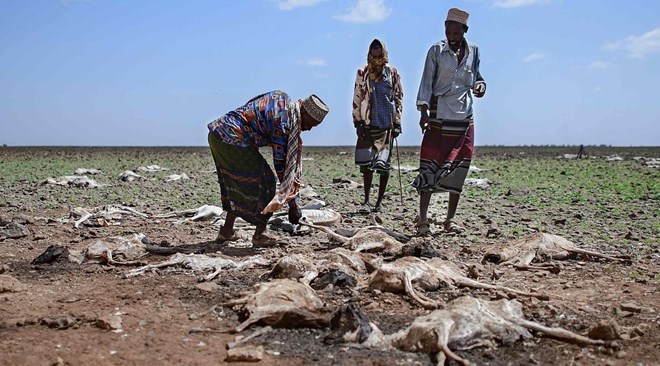The United Nations Office for the Coordination of Humanitarian Affairs (UNOCHA) has warned that an “unprecedented emergency” condition is ravaging drought-affected communities across the Horn of Africa (HOA).
UNOCHA, in its latest HOA drought regional humanitarian overview and call to action issued late Tuesday, said communities in the Horn of Africa are facing the threat of starvation following four consecutive failed rainy seasons in parts of Ethiopia, Kenya and Somalia, a climatic event not seen in at least 40 years.
“At least 18.6 million people are already waking each day to high levels of acute food insecurity and rising malnutrition across Ethiopia, Kenya and Somalia. This figure could increase to 20 million by September,” UNOCHA said.
About 7.4 million people in Ethiopia and some 4.1 million people in Kenya are severely food insecure due to the drought, UNOCHA figures indicate.
In Somalia, some 7.1 million people are now acutely food insecure, and eight areas of the country are at risk of famine between now and September, with the Bay region of particular concern, UNOCHA warned.
The October-December 2020, March-May 2021, October-December 2021 and March-May 2022 seasons were all marred by below-average rainfall, leaving large swathes of Somalia, southern and south-eastern Ethiopia, and northern and eastern Kenya facing the most prolonged drought in recent history, UNOCHA said.
It warned that early forecasts further showed that the October-December 2022 rainy season is also likely to fail.
UNOCHA said food prices are spiking in many drought-affected areas due to a combination of macroeconomic challenges, below-average harvests and rising prices on international markets, including as a result of the Ukraine crisis.
Amid rising food prices, the cost of a food basket has already risen by 66 percent in Ethiopia and by 36 percent in Somalia, leaving families unable to afford even basic items and forcing them to sell their hard-earned properties and assets in exchange for food and other life-saving items, it said.
UNOCHA said families across the drought-affected communities are taking desperate measures to survive.
With more than 1.1 million people leaving their homes in search of food, pasture, water and alternative livelihoods, UNOCHA warned that the situation increases the risk of inter-communal conflict, as well as heightening pressure on already limited basic services.
In addition to the multifaceted impacts of the ongoing drought, many drought-affected communities are also struggling to cope with the cumulative consequences of other shocks that include conflict, flooding, COVID-19 and desert locusts, UNOCHA said.
Source:  Thursday July 7, 2022
Thursday July 7, 2022
Read Previous Article:
Somali police arrest armed robbers, seize drugs in Mogadishu.

